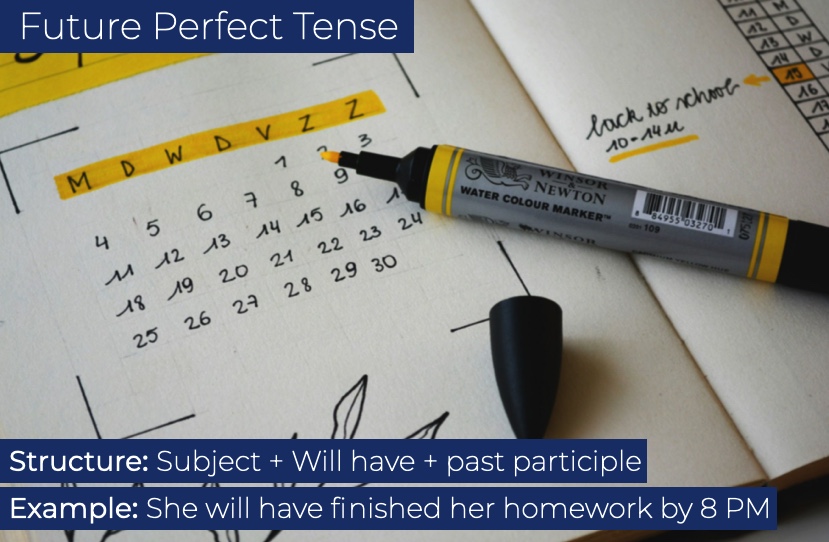Are you looking to talk about actions that will be completed before a certain point in the future? The future perfect tense is what you need! This tense helps you describe actions that will have been finished by a specific future moment, making your conversations and writing more precise. Let’s explore what the future perfect tense is, how to use it, when to use it, along with examples and a mini quiz to test your understanding.

What is the Future Perfect Tense?
Different from future continuous tense, the future perfect tense is used to express actions that will be completed before a specified time or another action in the future. It emphasizes the completion of an activity and is formed using “will have” followed by the past participle of the main verb.
How is the Future Perfect Tense Formed?
The future perfect tense is constructed with the subject, the auxiliary verbs “will have,” and the past participle of the main verb.
Affirmative Sentences
In affirmative sentences, the structure is:
Subject + will have + past participle
Examples:
- She will have finished her homework by 8 PM.
- They will have left by the time we arrive.
Negative Sentences
For negative sentences, add “not” after “will”:
Subject + will not have + past participle
Examples:
- She will not have finished her homework by 8 PM.
- They will not have left by the time we arrive.
Interrogative Sentences
In interrogative sentences, place “will” before the subject:
Will + subject + have + past participle?
Examples:
- Will she have finished her homework by 8 PM?
- Will they have left by the time we arrive?
When is the Future Perfect Tense Used?
1. Actions Completed Before a Specific Future Time
The future perfect tense is used to describe an action that will be completed before a specific time in the future.
Example:
- By next month, I will have completed my project.
2. Actions Completed Before Another Future Action
It is used to indicate that one action will be completed before another action occurs in the future.
Example:
- They will have eaten dinner before the movie starts.
3. Duration Before a Future Event
To emphasize the duration of an action that will continue up to a specific point in the future.
Example:
- By the end of the year, we will have lived in this city for ten years.
What’s your English level?
Discover your level now: A1/A2/B1/B2/C1/C2 and GET your certificate!
Examples of the Future Perfect Tense
- She will have read the book by the time the class starts.
- He will have saved enough money by next summer.
- We will have finished the project before the deadline.
- They will have traveled to five countries by the end of the year.
- I will have written the report by tomorrow morning.
Future Perfect Tense Exercises
- She ________ (finish) her work by the time you arrive.
- They ________ (not complete) the task by the end of the day.
- Will you ________ (learn) French by the time you move to Paris?
- He ________ (save) enough money for the trip by next month.
- We ________ (not start) dinner until you get here.
- ________ they ________ (graduate) by the end of the semester?
- I ________ (read) all the books on the list by the end of the week.
- She ________ (complete) the training by the time she starts her new job.
- They ________ (not leave) by the time we get there.
- Will you ________ (finish) the project before the deadline?
Answers:
- will have finished
- will not have completed
- have learned
- will have saved
- will not have started
- Will, have graduated
- will have read
- will have completed
- will not have left
- have finished
By mastering the future perfect tense, you can describe future actions with clarity and precision. Use this guide to enhance your English grammar skills and communicate more effectively!





